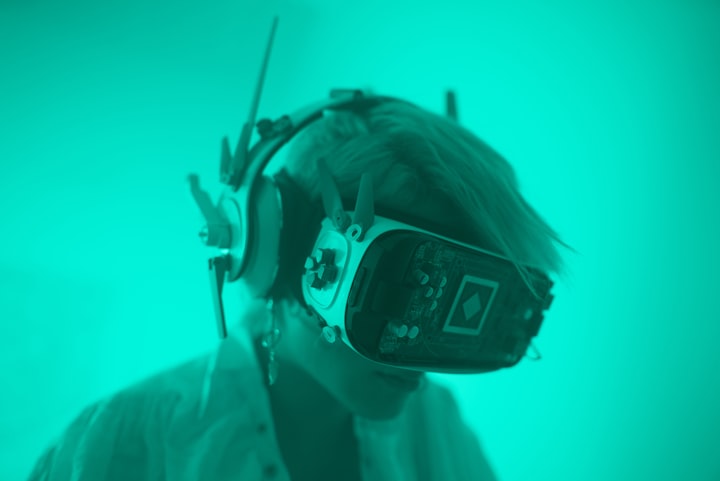The metaverse explained to people who still don't understand it
Is it just a buzzword, the new internet, a video game, or a vision? We asked experts to answer the most important questions about the metaverse phenomenon.

You, too, have certainly heard the term somewhere. Whether through Mark Zuckerberg's rather creepy virtual avatar in the Facebook rebrand, live concerts in the Fortnite universe, or digital art exhibitions - currently there is hardly any escape from the internet's current favorite term: metaverse.
But what exactly is this metaverse? Is it a virtual space with infinite possibilities that we can immerse ourselves in? Is it the dystopian future of the internet? Or is it just a catch-all term for all the technologies of augmented, virtual and blended reality?
When we talk about the metaverse today, it often feels like it did when people were discussing the internet in the 70s and 80s. When the foundations of this new form of communication were laid, people speculated wildly about what it would look like and how it would be used. Everyone was talking about it, but few people really knew what it meant or how exactly it worked. And then, in retrospect, the internet didn't develop the way many people had imagined.
However, because the metaverse is set to become an $800 billion market by 2024, and because tech giants like Meta, Microsoft, Apple, and Google are investing a lot of money in making it happen, let's take a closer look at what this rather vague and complex term actually entails.
So, what exactly is the metaverse?
The term "metaverse" has received a lot of attention, especially in recent years, but it has existed since 1992 when author Neal Stephenson first used it in his science fiction novel Snow Crash. In the book, the metaverse is an all-encompassing digital world that exists in parallel with the real world. In 2022, experts are still not sure if the Metaverse could evolve into something like that in our country.
"The metaverse is a 3D version of the internet and computing in general," says Mathew Ball, a venture capitalist, and investor who has written several essays on the potential and structures of the metaverse.
"When the internet and computing first emerged, all interactions were primarily text-based - such as emails, messages, usernames, and email addresses. Then everything evolved in a media direction through photos, videos, and live streams. The next step in terms of the application interface and user experience would be 3D."
For many experts, a metaverse is a place parallel to the real world where you spend your digital life, have an avatar, and interact with other people through their avatars. But some believe that the metaverse in its actual form doesn't even exist yet.
"It's not real yet and it won't be real until there's a single central place where people can immerse themselves in a virtual world that they could live in," says Ibrahim Baggili, a cybersecurity expert as well as director of the Connecticut Institute of Technology at the University of New Haven.
"The internet was called the 'information superhighway in the '90s, but that was more referring to a potential future of networked computers," says Timoni West, a vice president at the company Unity Software which heads its AR and VR divisions. "The Metaverse, with continued development, will also become like an equivalent to the real world and much more widespread, democratic, fluid and versatile."
You can tell the definition of the Metaverse varies from case to case. But the bottom line is that the Metaverse is a shared virtual place with interactive, immersive, and extremely realistic features. It also includes individual avatars and digital property, which is then probably stored on a blockchain.
So the Metaverse is not just a video game?
While the metaverse is much more extensive than a video game, the gaming world seems to have already adopted the most rudimentary form of the metaverse. One example would be the online shooter Fortnite, in which players create personal avatars to interact with each other. In addition, you can earn virtual money in the game and use it to unlock new outfits for your avatars.
What comes closest to the actual Metaverse vision and already exists is the simulation game Second Life. In this game, you have the opportunity to go shopping, eat, shower, and otherwise re-enact your own everyday life from real life in a kind of virtual reality with an avatar.
Various technology experts say that the Metaverse will take the virtual reality experience to the next level: Users would then be able to float through the virtual world and do anything they feel like - whether they want to buy a property, organize a party, or get married with the help of the digital avatars.
How can I access the Metaverse?
While there is currently no centralized way into the Metaverse, some experts advise getting a VR headset to fully enjoy the experience. But others argue that you don't need such hardware to get into the Metaverse.
"We have constantly connected to the internet anyway with smartphones in our pockets, Alexas in our living rooms, and cameras in the world around us," says venture capitalist Ball.
"Millions of people are in real-time 3D virtual worlds every day via tablet or smartphone. These devices will probably still be the main way into the metaverse a decade from now."
Accessing the metaverse via smartphone, tablet or computer takes away some of that all-encompassing aspect, but at the same time, it's a good way to try it out first and catch up with the hype.
Cybersecurity expert Baggili says the current structure of the metaverse is comparable to that of an app store. "Right now there are still multiple platforms that let you experience virtual and augmented reality. It's like the different apps that you can download from the stores. A single portal that allows people to access the metaverse - like Yahoo did back in the early days of the internet - doesn't exist."
This, in turn, has led to several major tech companies offering various corresponding experiences - from video games and virtual workspaces to live entertainment and virtual real estate. Examples would be platforms such as Decentraland, Axie Infinity, Horizon, Sandbox, Fortnite or Roblox.
What are the benefits of the Metaverse?
Considering the incredible financial projections, the Metaverse is considered an important factor in the growth of the digital economy. "The Metaverse is going to drive a lot of things here - and in turn drive growth in the global economy," says venture capitalist Ball.
While the metaverse is already seen by many as the future of entertainment, the fashion industry, the video game world,and even partying, some experts say it is best used in education.
"Education in 3D space is a lot better than teaching by zoom call," says Ball. Cybersecurity expert Baggili agrees: "The true added value of metaverse is most evident when it is used to enrich our lives," he says.
Baggili has already conducted a forensics lecture with VR headsets on a trial basis. "What was good about it was that we could document a 3D crime scene and create and save a consistent environment. But at some point my students' eyes got tired, then it was difficult to continue working on the computer," he says. "So there are scenarios where the technology and implementation are really useful. Still, a lot of work is needed."
Is the metaverse safe?
There is already a reason why fictional works around the metaverse - such as the film Ready Player One or the aforementioned novel Snow Crash - are set in bleak dystopias.
In the discussion around the metaverse, the question of whether it is even possible to create a safe and responsible space here comes up again and again. Earlier this year, Meta came under fire after a woman claimed she had been sexually harassed in the Metaverse. Digital privacy experts also frequently point out that the Metaverse could be used as the ultimate surveillance tool.
"The Metaverse doesn't just collect data on eye movements and hand movements and the cut of your room and so on, We also need to create a legal framework for what happens if you are harassed on a virtual platform. Because you're so deep into the technology, yes, something like that would have repercussions in real life."
"The metaverse assumes a certain level of trust in the technology," the cybersecurity expert continues. "Just like we trust Google Maps for navigation, even though we can never really be sure that it will lead us to the right destination. We have to think about a lot of legal things if we want to develop such technologies responsibly."
Will we be living in the metaverse in a few years?
Some experts believe that by 2030, a large proportion of people will be in some form of the metaverse. But despite the current hype, there is still a long way to go. The first challenge will be to make the necessary hardware accessible to all. Then, for many experts, so-called interoperability is another indispensable prerequisite - in other words, the ability to take virtual objects like clothes or cars from one platform to another. Then there are the legal and commercial challenges. For example, you have to determine who is to ensure law and order in the metaverse. And of course, there is no guarantee that people will want to hang out in the Metaverse all the time.
Perhaps we will only live in the metaverse to some extent. VR headsets are already an exciting toy, but you still don't want to keep them on for long. Or we will look back on this article in ten years and be amused at how naïve we must have been to doubt the Metaverse's success.
About the Creator
AddictiveWritings
I’m a young creative writer and artist from Germany who has a fable for anything strange or odd.^^






Comments
There are no comments for this story
Be the first to respond and start the conversation.